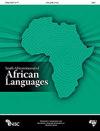Malawian and Nigerian migrants’ perceptions of the isiZulu interlocutors’ values and the effects on their willingness to acquire isiZulu
IF 0.4
0 LANGUAGE & LINGUISTICS
引用次数: 0
Abstract
AbstractThis article explores Malawian and Nigerian migrants’ perceptions of their isiZulu interlocutors’ values in Johannesburg. The aim was to determine the effects of such perceptions on the migrants’ willingness to acquire isiZulu. The study adopted a qualitative phenomenological research approach. Data were collected from one-on-one interviews and thematically analysed. Three categories of isiZulu interlocutor that were preferred by the migrants in this study emerged: (1) older women, (2) younger women, and (3) older men. Key values identified by the migrants include the interlocutors’ friendliness, openness, willingness to interact with the destination-language learners and willingness to guide and help learners in their learning process. The study established that migrants’ perceptions about interlocutors’ personal values have the potential to influence migrants’ willingness to acquire a destination language. Perceptions about interlocutors’ values affect both the direction and processes of language acquisition. Furthermore, the findings showed that migrants’ interest in learning a target language increases when interlocutors’ values are perceived to be desirable by the learners. Thus, perceived values can either promote or hinder interest and effort in acquiring a destination language.马拉维和尼日利亚移民对isiZulu对话者价值观的看法及其对获取isiZulu意愿的影响
摘要本文探讨了约翰内斯堡的马拉维和尼日利亚移民对其土著对话者价值观的看法。目的是确定这种看法对移民获得isiZulu的意愿的影响。本研究采用定性现象学研究方法。通过一对一访谈收集数据并进行主题分析。在本研究中,三种类型的isiZulu对话者被移民所偏爱:(1)老年妇女,(2)年轻妇女,(3)老年男子。移民认同的关键价值观包括对话者的友好、开放、愿意与目的语学习者互动以及愿意在学习者的学习过程中指导和帮助学习者。研究表明,移民对对话者个人价值观的看法有可能影响移民学习目的语的意愿。对对话者价值观的认知影响着语言习得的方向和过程。此外,研究结果表明,当学习者认为对话者的价值观是可取的时,移民对学习目标语言的兴趣就会增加。因此,感知价值可以促进或阻碍学习目的语言的兴趣和努力。
本文章由计算机程序翻译,如有差异,请以英文原文为准。
求助全文
约1分钟内获得全文
求助全文
来源期刊

South African Journal of African Languages
LANGUAGE & LINGUISTICS-
CiteScore
0.50
自引率
0.00%
发文量
30
期刊介绍:
The South African Journal of African Languages is a peer-reviewed research journal devoted to the advancement of African (Bantu) and Khoi-San languages and literatures. Papers, book reviews and polemic contributions of a scientific nature in any of the core areas of linguistics, both theoretical (e.g. syntax, phonology, semantics) and applied (e.g. sociolinguistic topics, language teaching, language policy), and literature, based on original research in the context of the African languages, are welcome. The journal is the official mouthpiece of the African Language Association of Southern Africa (ALASA), established in 1979.
 求助内容:
求助内容: 应助结果提醒方式:
应助结果提醒方式:


